Conventional cotton is a huge water hog, and towels marketed as “ultra absorbent” often shed microfiber plastics when washed and dried. Here are our top picks for sustainable towels made from eco-friendly materials, and free from dyes.
Table of Contents
As the climate changes, awareness surrounding the issue of water conservancy is growing, which is why so many consumers are on the hunt for organic towels that use less water in the growing and manufacturing process.
Microfibers and unhealthy dyes are also a big concern, which is why we curated this list of organic towels that are gentle on your skin and on the environment.
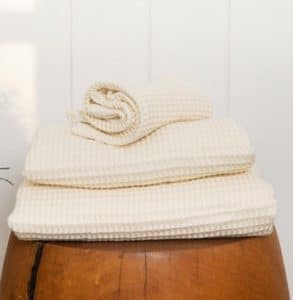
Our top pick for organic towels
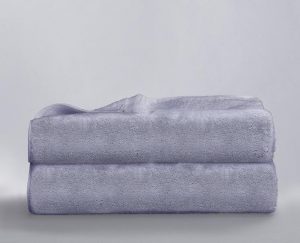
Best affordable organic cotton towels
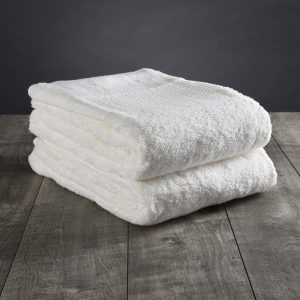
Excellent organic hemp towel option
Curious about how we rate products? Click here to view our methodology, which at its core, is about voting with our dollars to fight climate change.

Ettitude Bamboo Waffle Towel Set [Staff Tested]
Highlights: $64 for a 6-piece towel set, available in Natural and Slate (with matching robe), made with GOTS certified organic bamboo by a B Corp and 1% for the Planet partner.
I don’t normally recommend bamboo-based textiles at Leaf Score because they are generally made with a slew of toxic chemicals. Not so with Ettitude, which is why I got some for myself!
Made using CleanBamboo™, Ettitude’s waffle towels are eco-friendly, luxurious, and surprisingly affordable. This material is 100% organic bamboo processed in a closed loop system using an organic solvent and mechanical processes rather than toxic chemicals.
The Ettitude CleanBamboo™ process reuses more than 98% of the water, making these bamboo towels far better than cotton for overall water use. The company just had a compete Life Cycle Analysis carried out for their bamboo sheet set and results showed that while the Ettitude sheets used just 18 gallons of water per sheet set, comparable cotton sheet sets used 8189 gallons of water.
You can read more about the sustainability efforts at Ettitude in their thorough Impact Reports, published annually since 2020. I also talk more about my experience with Ettitude Waffle Towels here, as well as the company’s sustainability credentials.
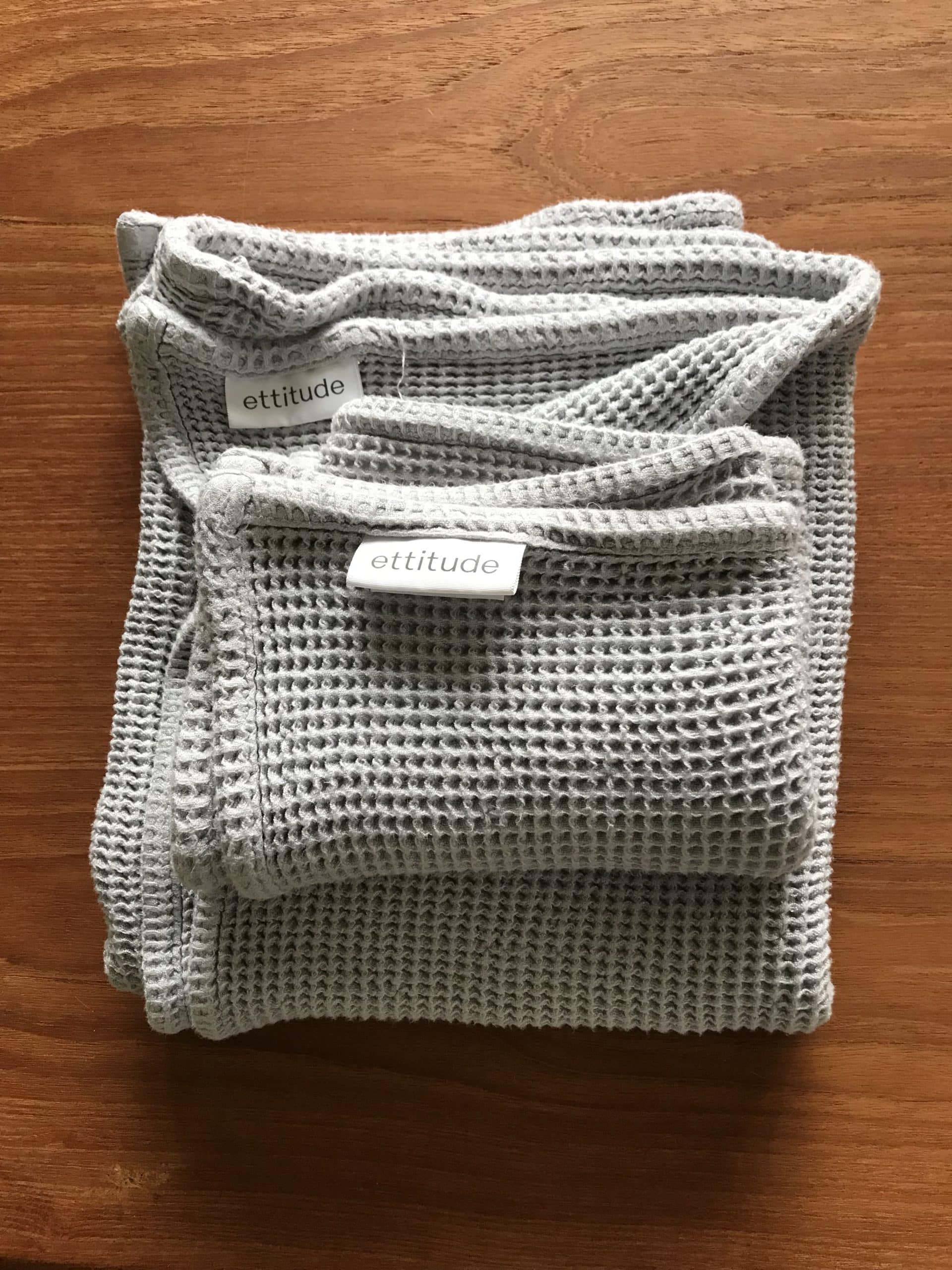
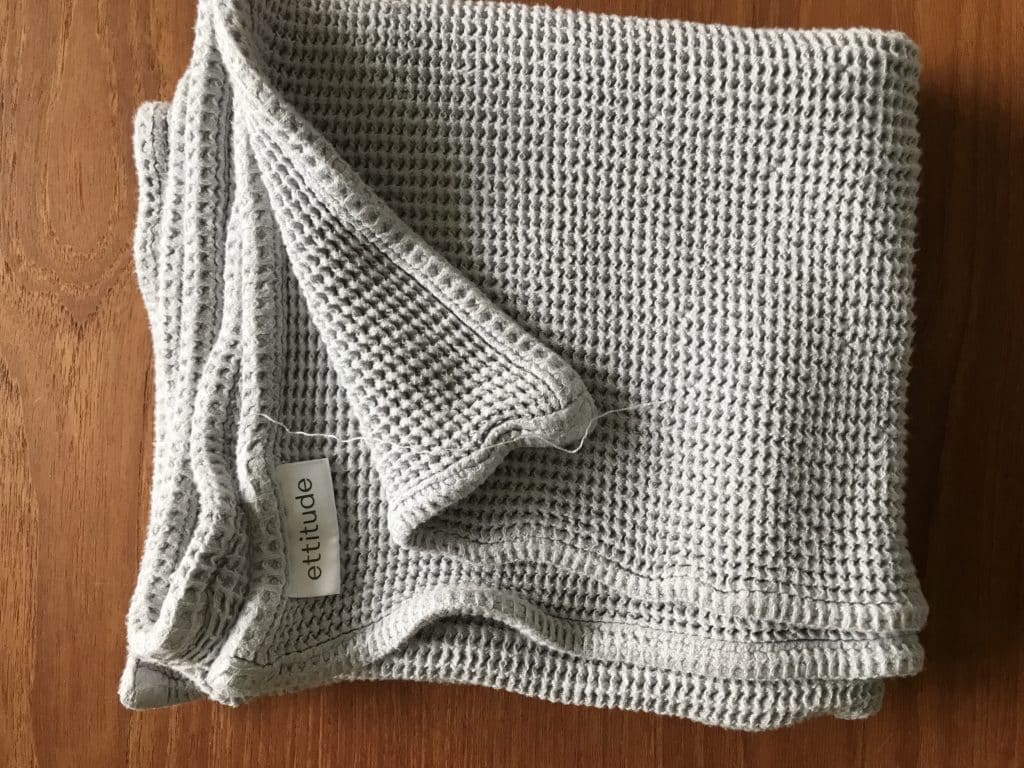
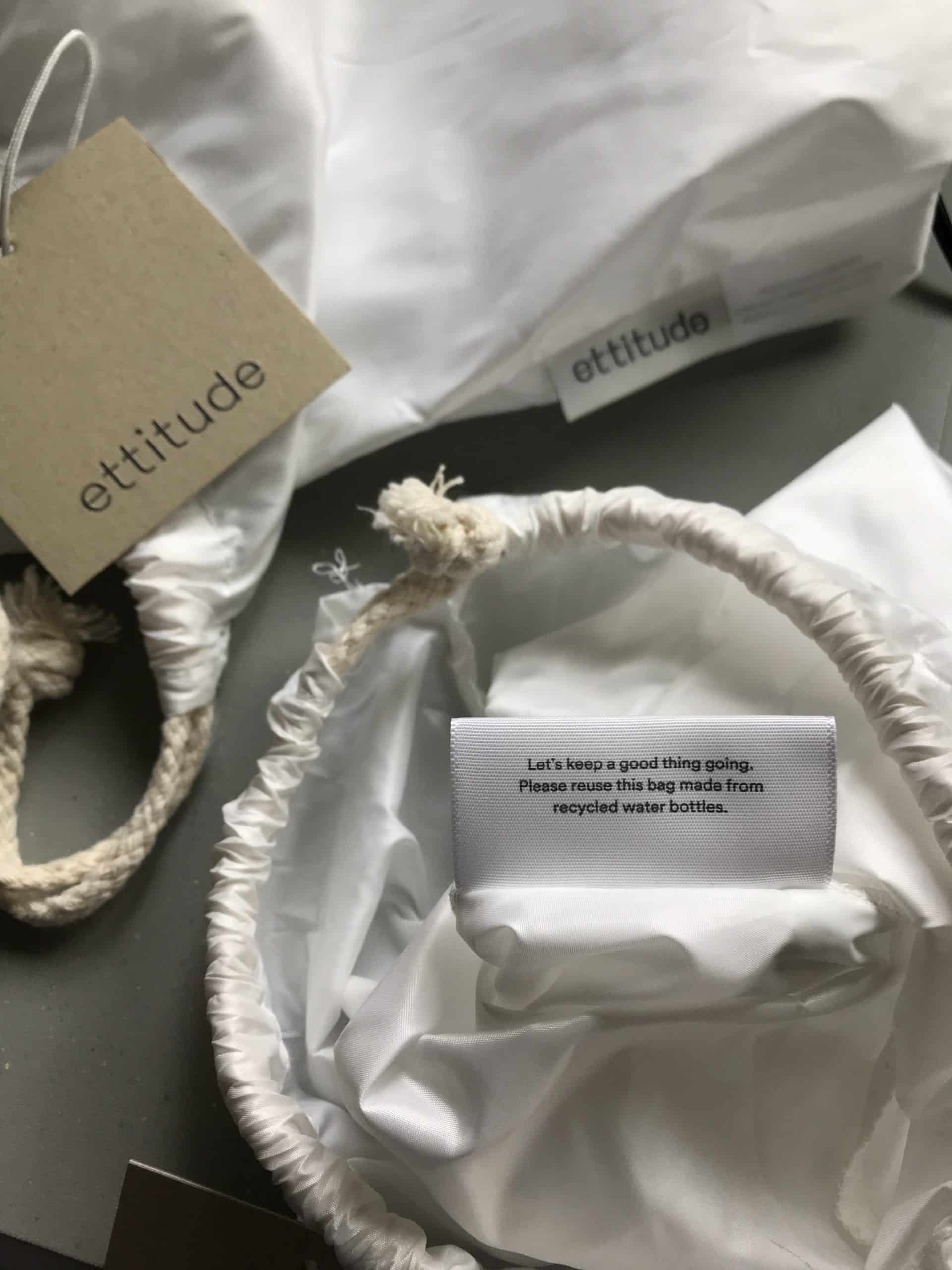
The short version is that Ettitude is a fantastic B Corporation and 1% for the Planet member that offsets all its carbon emissions, is Climate Neutral certified, and has a textile recycling program in Australia, plans to do something similar in the US, and plenty more eco-credentials to boot.
A great choice for bath, beach, and beyond, Ettitude towels are OEKO-Tex 100 certified, moisture-wicking, super soft, and have handy hook loops for easy hanging. The towels are pre-washed and packaged in a reusable drawstring bag made using recycled water bottles.
The collection also boasts a waffle hair towel and a hooded waffle towel perfect for babies. These towels can be machine washed cold on a gentle setting and can be dried on low or line dried. As I can attest, these towels feel soft and springy, are super absorbent, dry really fast without getting musty like cotton towels, and actually get softer over time. They also look great!

SOL Organics
Highlights: $180 for an 8-piece bath towel bundle made with GOTS cotton and Fair Trade.
Sol Organics is a great choice for fairly inexpensive organic cotton towels in a variety of colors. The company was established in 2010 with the goal to produce eco-friendly textiles using organic cotton while ensuring equality for all employees. Sol Organics manufactures its products through a factory in India that carries certifications including FLO, GOTS, Oeko Tex and Fair Trade.
The primary material is 100% organic long-staple cotton, grown from non-GMO cottonseeds, and Sol Organics is committed to reducing its carbon footprint, conserving and protecting drinking water, and keeping everyone safe from harmful chemicals (consumers, locals, and workers alike).
Sol Organics towels are made with super plush 700 GSM organic cotton without toxic chemicals. They offer a towel bundle and separates, all dyed with low-impact organic dyes.
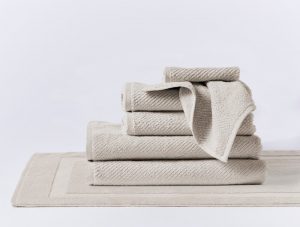
Coyuchi
Highlights: $128 for a 6-piece organic towel set that is GOTS certified, Made Safe™ certified, Fair Trade, and made by a 1% for the Planet partner.
Coyuchi is one of my go-to brands as the company consistently produces high quality eco-friendly products. Their towel collection is no exception, made from 100% certified organic cotton and created using a zero-waste water recycling method. My top choice is the Air Weight towel set which is super affordable for a 6-piece set, can be paired with a matching bath mat, and is durable, luxurious, absorbent, and available in several colors to nicely complement your bathroom aesthetic.
Coyuchi’s supply chain partners fully comply with the strictest environmental and social regulations, including REACH and the Restricted Substances List (RSL) of the American Apparel & Footwear Association (AAFA). Their towels are also certified GOTS and the company has Fair Trade certification and is a member of 1% for the Planet.
Coyuchi products also carry the MADE SAFE® seal, meaning they’re made without known behavioral toxins, carcinogens, developmental toxins, endocrine disruptors, flame retardants, heavy metals, neurotoxins, high risk pesticides, reproductive toxins, toxic solvents, or harmful VOCs. The products and processes also pose no known risk for chemical bioaccumulation, persistence, general ecosystem harm, or aquatic and animal toxicity.
Coyuchi are also involved in the Fibershed program which “develops regional and regenerative fiber systems on behalf of independent working producers, by expanding opportunities to implement carbon farming, forming catalytic foundations to rebuild regional manufacturing, and through connecting end-users to farms and ranches through public education”.

Delilah Home
Highlights: $199 for a six-piece organic towel set that is GOTS certified and made in Fair Trade factories by a 1% for the Planet partner in the US.
Delilah Home only makes products with 100% organic cotton and hemp and partners with Fair Trade factories where they pay above living wage. The company donates 10% of profits to local charities and is a 1% for the Planet partner.
As for the towels, these are made in Portugal, Europe, using 100% GOTS certified organic cotton and are shipped to their warehouse in Charleston, South Carolina, which is also certified by OneCert as GOTS. The towels are also Vegan.org certified and are made with long-staple organic Turkish cotton loomed in extra-long loops for softness and absorbency.
Delilah Home offers face towels/washcloths, hand towels, bath towels, and a bath sheet, all made with 100% organic cotton. You can also choose a 3-, 6-, or 12-piece set and pay a little less per towel. The towels are available in white, ivory, natural, light grey, and mineral green and the company offers free shipping on orders over $100 in the US. They are machine washable on a cold, gentle cycle and can be dried on low or air dried.
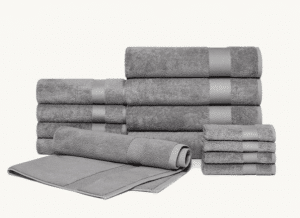
Boll & Branch
Highlights: $318 for a 13-piece complete plush towel bundle made with GOTS organic cotton, Fair Trade, and OEKO-Tex certified and packaged in a sustainable way.
Boll & Branch is a luxury bedding brand and the world’s largest consumer of Organic Fair Trade Certified™ cotton. The company also makes luxurious towels with the same long-staple organic cotton and in 700 GSM weight for plush, absorbent softness. These spa-quality towels are also OEKO-Tex 100 certified and Fair Trade, as well as GOTS certified.
Established in 2013, Boll & Branch use 100% organic cotton in all of their products and support Fair Trade Certified™ suppliers and practices wherever possible. Boll & Branch products are manufactured in India, Portugal, and the US,
Packaging is made from 100% recycled paper and can be recycled and/or repurposed, with 100% of the outer shippers also FSC certified. The company offers free ground shipping for U.S. customers and a full refund within 30 days if you’re not happy with your towels. There doesn’t, however, appear to be any other significant engagement with environmental issues from Boll & Branch.
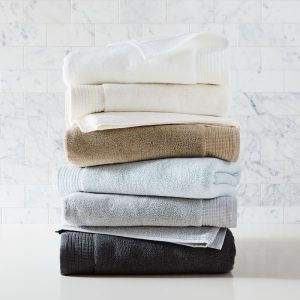
West Elm
Highlights: $117 for a 6-piece set of GOTS organic cotton towels that are also OEKO-Tex certified.
West Elm was the first home retailer to join Fair Trade USA™, back in 2014, and the company offers a wide range of Fair Trade Certified™ products including eco-friendly rugs, bedding, furniture, and towels. West Elm’s towel collection is made using 100% organic Turkish and Portuguese cotton and the towels are soft, fluffy, and absorbent.
These towels are also OEKO-Tex certified, and the range includes hooded towels for babies and children, striped and textured bath towels, hand towels, and face towels, a dish towel set, beach towels, and luxury bath sheets and bath mats. West Elm can even provide you with a bamboo towel rail to help keep towels tidy between uses!
West Elm committed a few years ago to using 100% organic cotton and it seems they’re getting closer to that goal. They currently state that “100% of our all-cotton bedding and bath towels are sustainably sourced, including organic.” So, not entirely organic, but close. They estimate having saved 2.3 billion liters of water in 2019 alone by sourcing organic cotton, and as partners with the Better Cotton Initiative, West Elm has helped to train more than 550 farmers in more sustainable practices.
West Elm also sustainably source over half of the wood used in their products and use recycled REPREVE® polyester in some products.
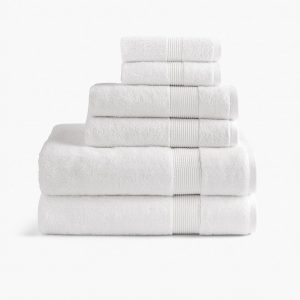
Under the Canopy
Highlights: $66 for a 6-piece towel set made with GOTS organic cotton and a touch of Lyocell.
Under the Canopy offer a range of organic textiles including signature, luxury, and textured towels made with GOTS certified organic cotton and 3% Lyocell, a biodegradable fabric made from wood pulp. This helps prevent bacteria growth, increase absorbency, and enhance durability, but also makes these towels potentially less sustainable than a fully organic cotton towel as there’s no indication where the wood pulp is sourced for the lyocell fabric.
Under the Canopy’s Signature Collection of towels has a weight of 650 GSM and is strong, soft, and absorbent thanks to two-ply, low-twist construction with ring-spun cotton. The towels are made with OEKO-TEX® MADE IN GREEN certified dyes, meaning vibrant color without harsh chemicals. The towels are machine washable on a warm, regular cycle and can be dried on low.
These towels are made by environmentally certified factories in the US, India, Turkey, and China.
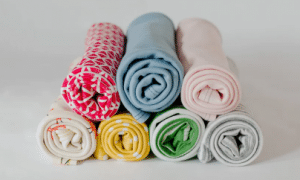
Sunrise Bliss
Highlights: $20-$38 for fun hair towels made with GOTS organic cotton and made in the US, with free shipping for orders over $35.
Sunrise Bliss only makes products using GOTS certified organic cotton and is a small, family company run by a couple in Michigan. Their specialty is hair towels made with super absorbent organic cotton t-shirt material that promises to help dry hair without causing frizz and breakages.
These hair towels come in a variety of fun prints in small, medium, and large sizes to fit the whole family. Sunrise Bliss also offers a handful of other products made with organic cotton, including face masks and kitchen towels.
As a small company, Sunrise Bliss doesn’t yet seem to have any overt sustainability engagement, outside of using GOTS cotton.
Organic towels FAQ
Even household textiles made with natural fibers like cotton have often been treated with harsh chemicals and dyed using toxic substances.
Next, conventional cotton is also a huge water hog and is grown using massive amounts of pesticides and other chemicals that can harm the environment. With the Colorado River facing unprecedented shortages, it’s important we all pay close attention to the ways our purchasing decisions impact the planet, especially our water sources.
Poorly made, scratchy, thin, non-absorbent towels make for an unpleasant experience and, chances are, these will wear through quickly and need replacing frequently. Choosing better quality towels from the get-go can mean years of happy bathing while using fewer resources. This helps to reduce your towels’ overall environmental impact and can save you money too.
Some towels are advertised as super absorbent and are made of ‘microfiber’. This means they are synthetic and will shed microfiber plastics when washed and dried. These plastic fibers are bad news for wildlife as they can lead to disease and death in fish, birds, amphibians, and other small animals.
Some towels are also advertised as antimicrobial, meaning they’ve been treated with biocides. While this sounds great for anyone who has had to deal with a smelly gym towel, it’s far better to just launder towels regularly as these biocide chemicals can be highly damaging to wildlife and contribute to antibiotic resistance.
If you can, it’s best to avoid towels (which are a regularly washed item) that are made from polyester, viscose, rayon, or polyamide. These types of materials are also not biodegradable and are harder to recycle, meaning they end up in landfill where they may pose further risks to the environment.
In general, avoid anything advertised as microfiber and instead choose towels made from:
Organic cotton
Hemp
Select types of bamboo (see below).
In addition to choosing more eco-friendly materials for towels, consider how these materials are treated after they’re harvested.
This means checking that the towels are not bleached using chlorine bleach and are not dyed with carcinogenic azo dyes. Ironically, natural fibers treated with azo dyes and other harsh chemicals such as chlorine tend to leach more of these chemicals when used and washed as the fibers are less effective at holding onto the chemicals compared to some synthetic fibers.
One startling report found that a whopping 4.44 tons of hazardous dyes are likely released every year into wastewater in the European Union just from washing cotton and polyamide textiles during manufacturing. By following good manufacturing practices, companies can reduce this effluent impact around five-fold.
As for bamboo towels, while this fast-growing fiber is far less resource hungry, it is almost always processed into soft fibers using damaging chemicals.